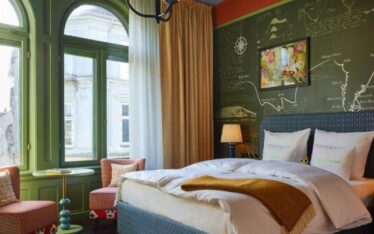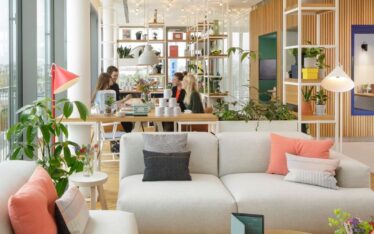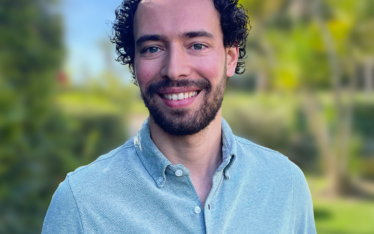From hybrid hotels and hostels to coliving and coworking spaces, concepts are continuing to merge as consumer behaviour changes faster than ever before.
In this series, we’ll help you stay ahead of the curve as we look at the latest hybrid hospitality industry news that highlights the changing nature of how people stay, live, work and play – and offer our insights on what this means for the hospitality industry.
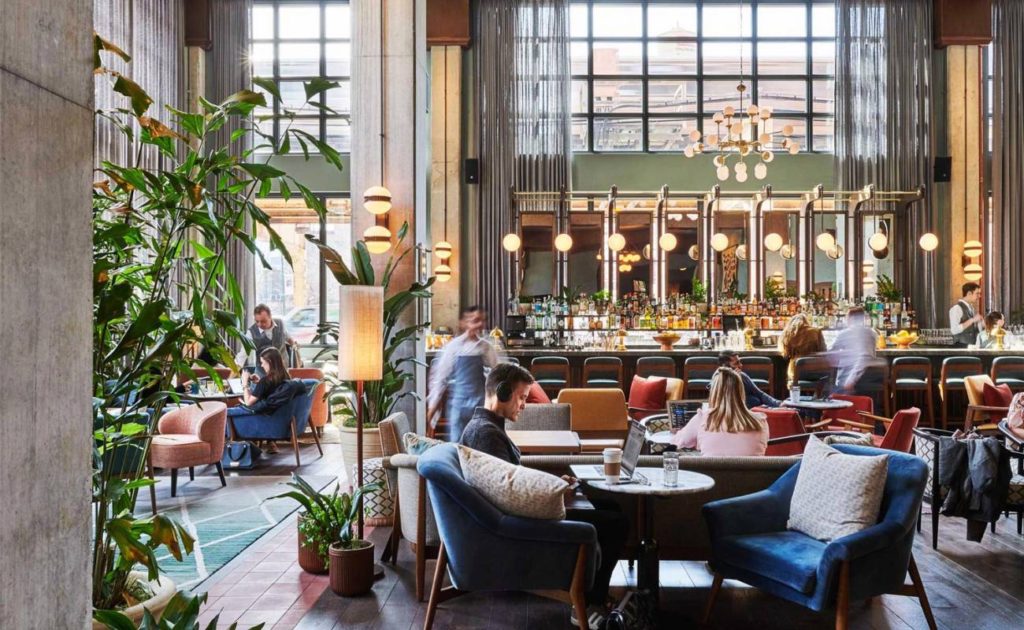
1. FOCUS ON LOCALS IS THE KEY TO ENNISMORE’S SUCCESS
In this recent interview with HOTELS, Ennismore co-CEO Guarav Bhushan revealed that focusing on the local community is a key to the growing lifestyle platform’s success. Here are some of the key insights he shared…
On becoming neighbourhood hubs:
“Our entire focus is on integrating ourselves into the local community and not just being a destination for travelers. It is as much, if not more, about locals… We’re trying to make these hotels feel like part of their communities. Travelers are actually more attracted to stay there because they think they’re in a place where they can actually interact with people from the neighborhood.”
On integrating a successful co-working concept into a hybrid model:
“Combining co-working with a fully integrated lifestyle platform – I don’t believe anyone has done that really successfully. We believe we’re right at the forefront… what makes it interesting and successful is that it’s part of a bigger lifestyle ecosystem. You have the hotel, the bars and restaurants, a destination where people are not just happy to work but where guests can come and stay.” On the benefits of creating more brands vs scaling one:
On the benefits of creating more brands vs scaling one:
“The whole point of having more brands is to make sure you don’t dilute a brand by over scaling. We want to make sure that we can get scale with the entire Ennismore platform, which you need to run a profitable business, but you don’t want to necessarily scale each brand. We are trying to keep each brand authentic, focused on making sure they have a purpose, a mission. That way, we can stay true to what the brands stand for and they can stand the test of time.”
You can read the full interview here.
2. THE STUDENT HOTEL SECURE €145 MILLION FUNDING IN NEW DEAL
Hybrid hospitality pioneers The Student Hotel (TSH) have reached an agreement with UniCredit for social and environmental impact financing of €145 million for the development of two new locations in Rome and the company’s second location in Florence. Financial insurance company SACE also supports the financing with a green guarantee of €54 million.
TSH and UniCredit have agreed to include impact financing terms in the form of a discount on the interest rate, which TSH has committed to reinvest by providing students from disadvantaged socio-economic backgrounds scholarships and rent reductions.
The projects will support the regeneration of the San Lorenzo district in Rome and the Belfiore district in Florence, revamping the areas for the local communities and expanding the availability of student housing in both cities.
The financing supports TSH’s growth strategy as it looks to open 10 hotels across Europe by 2025, taking the total amount of operational hotels to 25. TSH has recently secured €300 million from existing shareholders to fund the growth strategy.
Get the full lowdown here.
And you can listen to our past interview here with Charlie MacGregor – CEO & Founder of The Student Hotel – for The Hybrid Hospitality Podcast. We discussed the resilience of the hybrid model, how the student spirit is a mindset rather than a demographic, and why brands need to go beyond the buzzword when it comes to community.
3. HOW HOTELS CAN TAKE ADVANTAGE OF HYBRID HOSPITALITY
The past 18-months has seen an acceleration in the number of hybrid hospitality projects as well as increased investor interest in this area – but how can hotels leverage this?
That’s what this article by Goodwins Partner’s Matthew G. Pohlman and Brenn J. Coyle sets out to answer. The piece looks at the opportunities for hotels to get more out of their spaces by reimagining their current set up and adding complimentary components in order to create more dynamic environments that will ultimately drive improved financial returns.
Suggestions include adapting single-use hotels to incorporate residential products like coliving, co-working spaces, wellness spaces, general entertainment spaces and new F&B concepts. One example could be replacing in-person check-in with digital kiosks and repurposing reception space into a F&B area or coworking space to enhance guest experience
As the article points out, several factors need to be weighed up when deciding whether to adapt an existing hotel to a hybrid model. This includes considering access to capital, expected demand levels and the needs of the immediate neighbourhood as well as the impact on staffing and deployment of new technologies.
Despite these many considerations, the benefits of pivoting to a hybrid model are summed up perfectly with the concluding sentence: “if well-conceived and implemented, the hybrid operating structure can drive superior financial returns while also delivering an operating model more capable than their single-use counterparts of withstanding adverse demand shocks.”
4. HOTELS ARE NOT THE FUTURE OF HOSPITALITY
The future of hospitality looks very different to your traditional hotel, as highlighted in this article by Jens Munch, CEO of Pace Revenue – the only hybrid-native revenue platform on the market.
Drawing on Pace’s experience working with trailblazers The Student Hotel, this piece breaks down the steps disruptive hybrid hospitality companies are taking to stay ahead in a time when consumer behaviours are rapidly transforming.
From re-thinking the asset-light approach to selecting the right technology partners and the importance of data, Jens shares valuable insights into building the right capabilities and infrastructure to serve the demands of the modern consumer.

5. SELINA CEO SHARES INSIGHTS ON CATERING TO DIGITAL NOMADS AND BUILDING FOR THE LOCAL COMMUNITY
It’s safe to say Selina are leading the way when it comes to catering for digital nomads with opportunities in this market only accelerating in a post-Covid world.
As more players enter the hybrid hospitality sector, how will the brand stay ahead?
In this conversation with PhocusWire, Selina co-founder and CEO Rafael Museri answers this question and more…
On the gap in supply and demand when it comes to Millennial and Gen-Z:
“You look at all the hospitality brands around the world and ask yourself how many brands are truly built to cater to those two generations, and there’s very few – 2%, 3%, 5%? You can argue about what it is, but it’s definitely not even close to the level of demand that exists… The fact that Selina is in six different continents and in different countries and has succeeded in more than doubling the revenue than the previous hotel means that the previous concept was not really aligned with the needs of those generations.”
On building for the local community:
“The most important thing about Selina is that we are built for the local. I’m not building for the international traveler. I already know the international traveler, the international remote worker, and the digital nomad is looking for local experiences… by building a product designed for domestic you’re ensuring that once the international tourist comes back they are going to come first to your space because they are looking for these local experiences.”
On focusing on secondary markets:
“Seventy-percent of our locations are off-the-grid places – more remote, surf beaches, mountains, places with more nature… I don’t know of an international brand, growing the way we are growing in lifestyle, with a big focus on experiential and in remote, off-the-grid secondary markets.”
On choosing to go public via SPAC:
“The majority of the capital we need to grow geographically and open more beds comes from local real estate partners that help us to fund the expansion… The advantage of a SPAC is you can choose your partner… I personally believe that internally, we have been working on for a year and a half every process, every improvement that needed to happen to become a great public company, and whether SPAC or IPO, the readiness is the exact same process.”
On the importance of a strong brand in driving direct bookings:
“When you have a strong brand, one of the best indications is to measure what percentage OTAs is of your business. We’re a young company, and OTAs as a percentage of our total revenue is lower than companies that have existed in the market for 20 years.”
You can read the full interview here.
6. NEW HYBRID CONCEPT TO LAND IN PRAGUE
HOTELS recently spoke to Julius Meinl, co-founder of The Julius, to learn more about the family’s plans to bring hybrid hospitality to Prague.
Opening it’s doors this Spring, The Julius – the Meinl family’s first jump into the hybrid hotel space – will offer 168 short and long-term apartment-style residences with coworking and communal social spaces, lounges, on-site retail and F&B.
Travelers today want more space of their own, more flexibility and to stay in venues that provide the services that they really value. The Julius recognizes this and makes it central to the offer.
Explaining the concept, Meinl said: “Our destinations are not traditional hotels; they are a fusion of hotels and living spaces – a concept that we created even before the pandemic… Whether staying for one night or one month, our guests experience the freedom of apartment living alongside a first-class experience tailored to their preferences. Moving away from the traditional reception desk, our innovative use of tech creates a streamlined guest experience, allowing self-check in, access to a local’s guide for the city and everything they need to get the most out of their visit.
They are also dedicated to personalising the guest experience, with each booking tailored to the needs and preferences of the guest, providing options such as an individual address for deliveries and detailed guides to help navigate the city as a local.
Beyond this flagship site, further openings are planned for Belgrade and Budapest. Longer term, the Meinl family wants to further expand the concept – first in central Europe.
7. ACCOR TRAVEL TRENDS REPORT LOOKS AT HYBRID REAL ESTATE AND WORKSPITALITY TREND
The inaugural Accor Northern Europe Travel Trends Report looks at how Covid has changed our behaviour and how this will influence the way we travel, live, work and play in 2022 and beyond.
On page 30, the report addresses how changing lifestyles and remote working as a result of the pandemic has impacted real estate. Calling hybrid models “the next stage in the evolution of real estate”, Camil Yazbeck – SVP of Development for Accor Northern Europe – predicts “what was previously a single use concept, may tomorrow be hybrid real-estate – ground level F&B, two floors of meeting space and co-working such as WOJO, a wellness floor, 10 floors of hotel, five floors of branded residences and rooftop F&B concepts – a complete urban offering all within Accor’s ecosystem.”
And it seems guests agree that hotels should be a one stop shop, especially when it comes to remote working – in the survey, 43% said that it was now crucial places such as hotels have “suitable facilities to enable my job to a high standard”. Over one in five (21%) expect remote working to be the norm in their job.
You can download your copy of Accor’s full report here and read more about the evolution of the hybrid model in hospitality by downloading our past white paper.
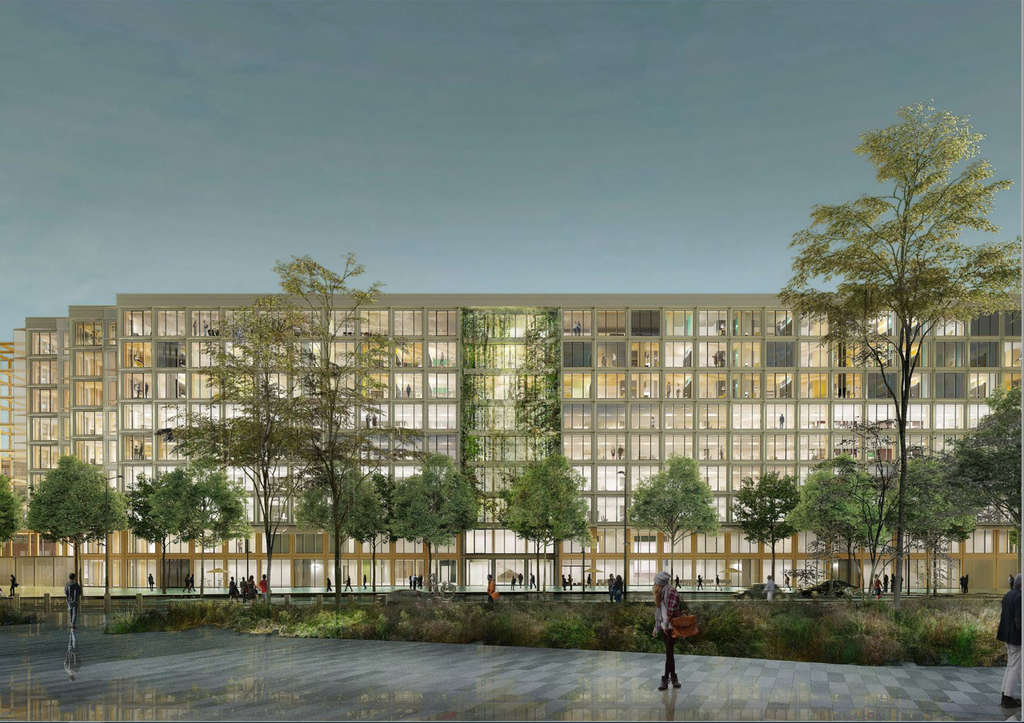
8. ZOKU SAYS BONJOUR TO PARIS
Award-winning hybrid hotel brand Zoku is arriving in Paris.
Renowned for their innovation in the hybrid hospitality space, the trailblazing brand’s latest opening will include 109 of its award-winning Loft rooms, as well as a coworking space and a variety of shared social spaces including a restaurant, bar, roof terrace and event space.
Boasting 5,500 m2 of floor space, it will be located within the Stream Building – an ambitious mixed-use project that will become a modern urban hub in the city’s 17th District.
As with their other locations – in Amsterdam, Copenhagen and Vienna – Zoku Paris will provide a home base for those who want to live and work in Paris anywhere from a few days to a few months.
We caught up with Zoku’s Co-Founder & Managing Director, Hans Meyer, for the very first episode of The Hybrid Hospitality Podcast. We discussed the secret to the success of the hybrid model and the importance of putting your audience at the centre of everything you do – give the episode a listen here.
Find out more about Zoku’s Paris opening here.
9. BLURRING LINES BETWEEN BOUTIQUE HOTELS AND VACATION RENTALS
This piece for Boutique Hotel News – written by Jeremy Call, CEO of property care and operations platform Breezeway – looks at the convergence of hotels and vacation rentals.
In the wider context, this blurring of the lines began when hotels and vacation rentals began competing for space on OTAs – Booking.com and Expedia started listing rentals on their sites and Airbnb soon followed suit by adding hotel rooms to its platform. Soon after, global hotel chains began to diversify by moving into the vacation rental space and vacation rental brands that felt like hotels – see Sonder – grew in influence.
But it’s changing guest expectations that are driving this merge on ground level. As Call points out, modern guests are increasingly expecting a hotel-like experience from vacation rentals. In response to these rising standards, property managers are adding “concierge comforts” like airport transfers and mid-stay cleans.
On the flip side, technology in hotels is transforming the guest experience to match that of vacation rentals with contactless entry and virtual concierge services creating a seamless experience that has less interaction with staff.
You can get the full lowdown here.
ALL THE LATEST HYBRID HOSPITALITY INDUSTRY NEWS FROM STAY THE NIGHT
We hope you enjoyed this round-up and we’d love to hear your own insights into the topics we’ve covered here, in the comments or on our social media channels.You can follow us on Instagram for more hybrid hospitality industry news and tips.
Let us know if you have any news to share that you’d like to see included in the next round-up by dropping us a line on hello@staythenight.net.
Looking for specialist marketing support for your hybrid hospitality brand? Email charlotte@staythenight.net.

